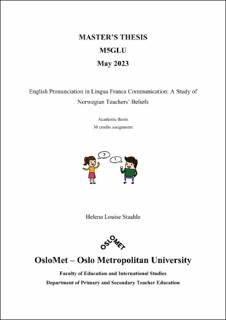| dc.description.abstract | As English has become a global lingua franca, the way the language is used has changed. Technology, business, travel, and social media means most people are exposed to English, and today most people in Norway can speak English. Additionally, there are currently more non-native speakers of English than native speakers, and because of this, local variations and non-native accents are more present than ever before. Within the field of English language teaching, the question is how one should speak English. Does accent matter? Does pronunciation matter? Previous research shows that this can be a personal question, with answers depending on someone’s beliefs. As this is the case, what teachers believe could their influence teaching, as well as their students’ learning. Therefore, the purpose of this thesis is to explore teachers’ beliefs and attitudes toward native and non-native variations of English and gain broader knowledge of how their beliefs impact teaching and learning. Therefore, the research question for this study is: What are English teachers’ beliefs regarding pronunciation in lingua franca communication?
As beliefs are personal and dependent on the person, a qualitative method was used for this thesis. Through two focus-group interviews with teachers with work experience from 5th-7th grade and 8th-10th grade, semi-structured interviews let the teachers explain their beliefs regarding pronunciation. The results reveal an interesting tension. The teachers are generally positive to implementation of non-native varieties of English in the classroom, and do not mind non-native accents. However, their personal beliefs still show signs that native speaker standards are prevalent amongst them, especially regarding Norwegian-accented English. This tension between professional beliefs and personal beliefs shows that there is need for more research in this field, and that teachers who are positive to non-native varieties still struggle with moving away from the traditional approach to language teaching. | en_US |
